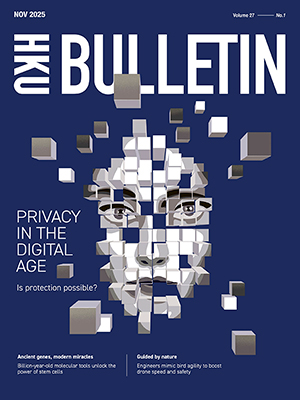May 2025 | Volume 26 No. 2
Online, in Touch
Listen to this article:
“These positive associations were observed in more than 87,000 people across 23 countries and, representing a wide variety of cultural and economic contexts,” said Professor Zhang Qingpeng, from the Department of Pharmacology and Pharmacy and HKU Musketeers Foundation Institute of Data Science. “We found that elderly people who engage online report higher life satisfaction and better self-reported health, as well as fewer depressive symptoms.
“One of the key implications is that the internet can be a valuable tool which offers older people opportunities for social connection, access to services, and engagement with resources that might otherwise be difficult to obtain. Our study also suggests that promoting internet access and digital literacy among older populations could be a cost-effective strategy for improving mental health, particularly in regions where traditional mental health services are less accessible.”
Previous research on the topic has tended to focus on specific regions with mixed findings. This study is one of the first to provide robust evidence on the relationship between internet use and mental health among older adults across a wide range of countries.
The data came from six large, publicly available ageing cohorts, from high-or middle-income countries, including the US, England, Europe and Israel, China, Mexico and Brazil. Each cohort follows a similar longitudinal design involving nationally representative samples of middle-aged and older adults and contains detailed information on physical and mental health, socioeconomic factors, and lifestyle behaviours.
By combining data from these multiple international studies, the researchers were able to analyse the relationship between internet use and mental health in a large sample of individuals across diverse countries and contexts. “These datasets are available to researchers through public access or specific research collaborations, ensuring transparency and reproducibility in our study,” said Professor Zhang.
Regular usage
The researchers categorised internet use based on frequency into several levels: ‘never’, ‘less than weekly’, ‘weekly’ and ‘daily’. “The regularity of internet use seems to enhance the potential benefits, as it provides continuous access to social connections, information, and services that can support mental well-being,” he said. “Specifically, individuals who used the internet more frequently – especially those who used it daily – reported better mental health outcomes.”
Based on the findings, the team believe that tailored interventions leveraging internet connectivity hold the potential to improve mental health among middle-aged and older populations. Such interventions would need to be personalised, taking into account sociodemographic characteristics, health behaviours, physical health and genetic risk.
“For example, using mobile health apps to encourage fitness and monitor wellness may be more beneficial for mental health in older adults without sufficient physical activity, as regular exercise has been shown to reduce depressive symptoms and improve life satisfaction,” said Professor Zhang. “These apps could provide reminders, track progress, and offer tailored exercise plans to motivate users. Further, telemedicine platforms and online consultations enable seniors to access healthcare remotely, making it easier for them to manage their physical and mental health.”
E-learning opportunities
“For older adults who are already physically active, other types of interventions, such as e-learning programmes or online hobbies, can be used to engage them mentally. These could include online courses that encourage lifelong learning, virtual arts and crafts workshops, or forums where they can explore new interests and passions. Such activities stimulate cognitive engagement, promote creativity, and provide opportunities for social interaction – all of which are important for maintaining mental health in later life.”
Online social platforms also allow them to maintain relationships with family, friends and support networks, reducing feelings of loneliness and isolation.
While the team have not yet begun developing related intervention programmes, they view this as a promising avenue for future research. “It is one of the potential directions we may pursue, with the aim of translating our findings into practical solutions that can help improve mental well-being in middle-aged and older adults,” said Professor Zhang.
Depression projection
Professor Zhang’s findings come at the same time as an economic modelling study on depression health – the first of its kind in Hong Kong – has revealed the city will face a significant and ongoing burden of depression from 2023 to 2032. The study, led by Professor Shirley Li Xue from the Department of Medicine and Department of Pharmacology and Pharmacy, estimates that Hong Kong’s average yearly healthcare cost linked to depression to be HK$2.51 billion, affecting more than 55,000 people. Finding ways to engage people positively is therefore becoming increasingly important for both the improvement of individual mental well-being and the reduction of this economic burden.
The internet can be a valuable tool which offers older people opportunities for social connection, access to services, and engagement with resources that might otherwise be difficult to obtain.

Professor Zhang Qingpeng

